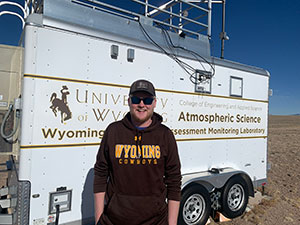UW School of Energy Resources Student Conducts Fieldwork in Mobile Air Quality Lab
Published August 04, 2021

Isaac Boettcher, an Idaho Falls, Idaho, senior in the School of Energy Resources (SER), recently conducted fieldwork to survey methane emissions as part of an internship with the Center for Air Quality (CAQ) at the University of Wyoming.
Boettcher was awarded the research internship through a generous endowment from the Nielson family as part of his studies in the energy and environmental systems concentration for his degree. He is a student in SER’s energy resources management and development degree program.
The CAQ is a faculty-led Center of Excellence supported by SER. Led by researchers in the UW College of Engineering and Applied Science’s Department of Atmospheric Science, the center conducts important energy and economic development research that benefits the state by monitoring and mapping air quality assessments.
With an emphasis on measuring volatile organic compounds and aerosol particles in the atmosphere, the center often works to understand how emissions from oil and gas extraction impact air quality in the Mountain West. Most recently, research has been conducted related to methane and volatile organic compound emissions from oil and gas extraction with a mobile air quality laboratory. With the advantage of taking measurements at multiple sites, the mobile facility is instrumental in filling the gaps between stationary survey laboratories.
With supervisor Robert Field, a UW atmospheric science senior research scientist, Boettcher was tasked with assisting the CAQ in a cooperative agreement with -- and funded by -- the U.S. Bureau of Land Management (BLM). The Wyoming Air Quality Assessment and Outreach Program performs air quality monitoring that is required by National Environmental Policy Act (NEPA) assessments to facilitate oil and gas development in Wyoming.
“The internship was a great opportunity,” Boettcher says. “It was really fun and satisfying to watch the whole project develop. For the most part, everything went smoothly. We had to tinker with the machine and overcome some unforeseen obstacles, but to come out on the other side with some really good data was pretty rewarding.”
As part of that research, Boettcher and Field conducted a weeklong field campaign in May to perform mobile surveys of methane designed to connect data collected from a long-term background monitoring station located in Carbon County with the Continental Divide-Creston Junction natural gas development project.
“The fieldwork was necessary because long-term monitoring at a downwind site from the development area was required from the record of decision from the NEPA assessment for the project,” Field says. “This was primarily due to concerns regarding the formation of ozone from development activity emissions that could influence the Medicine Bow-Routt National Forest.”
To achieve their objective, Boettcher and Field developed a number of possible survey routes that they evaluated in fall 2020. With challenges posed by COVID-19, the targeted landscape terrain, equipment issues and the Wyoming weather, the researchers finally were able to perform their fieldwork this year.
While on the road, Boettcher and Field combined remote mapping with on-ground surveying to accurately complete five different surveys, lasting approximately six hours each.
“Fieldwork preparations were straightforward, though delayed. It was important that we used a route that would take us through all of the right places,” Boettcher says. “We plotted a couple of different routes, with a plan to do the fieldwork over Christmas. However, after some recon, we discovered that some of the roads were closed, so we had to wait until summer.”
In their survey work, the two used a state-of-the-art, fast-response Picarro methane analyzer, coupled with a bespoke inverter and battery set up inside a dedicated truck. UW’s Department of Atmospheric Science research engineering and technical support group provided the vehicle and setup to allow sufficient power supply for surveying for an entire day.
With variable atmospheric conditions throughout the surveying week, Boettcher and Field collected some interesting data that are being evaluated for a final report to the BLM later this fall. The data are being processed in collaboration with the Wyoming Geographic Information Science Center (WyGISC) on the UW campus.
“Now that we have collected our data, it is important that we produce useful and coherent results,” Field says. “Our partnership with WyGISC has really enabled us to do so by developing a visual representation of the data and corresponding analysis.”
Collaborations between different units at UW have increasingly benefited research objectives and enhanced effective outcomes.
“Working with groups across campus is a key part of the WyGISC mission,” says Shannon Albeke, a WyGISC senior research scientist. “In this project, we developed automated methods using Program R to more rapidly summarize and visualize these dense spatial datasets of methane concentration and move digital data into a tool for future policy discussions.”
Overall, the project has been a flagship to highlight the strength of UW to deliver high-quality research that supports industry and government goals for energy development and environmental protection in Wyoming. It is a small part of a wider initiative at UW to include undergraduate students with career-enhancing research opportunities.
Following graduation, Boettcher plans to use the experience and connections gained through the internship to work in the environmental field. He also is considering earning a master’s degree.
“Helping to collect air quality data in the field was valuable, as I gained a deeper appreciation of measurement science and reinforced the understanding I gained from the classroom,” Boettcher adds. “I’m very grateful for the amazing chance I had to do this work and to Dr. Field for guiding me through the whole process.”

